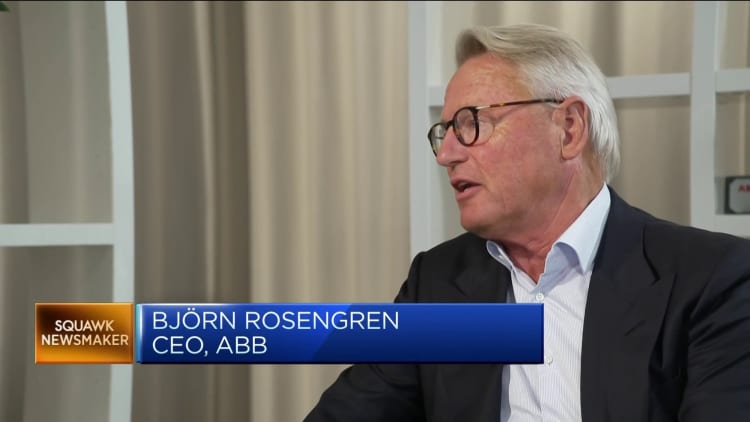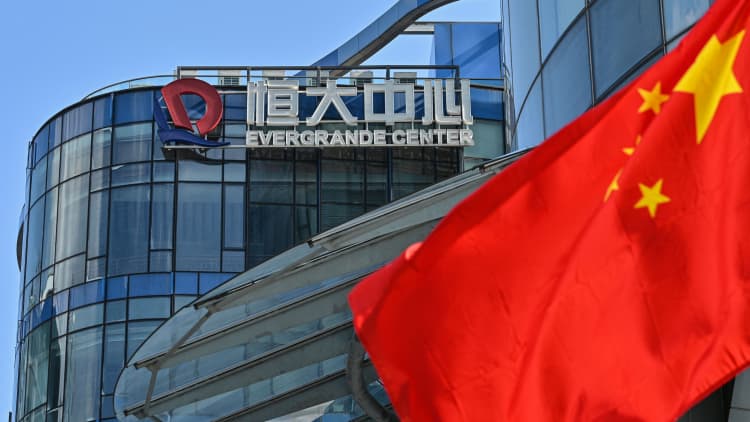[ad_1]

The CEO of Swedish-Swiss multinational robotics firm ABB said he has been “disappointed” by the state of the Chinese market, adding he expects conditions will prove challenging for the rest of the year.
“China is not really developing as we hoped in the beginning of the year,” said Bjorn Rosengren, CEO and chairman of ABB, speaking with CNBC’s Joumanna Bercetche on Wednesday, adding ABB has been impacted by a “softening” in China’s property sector.
Rosengren said that a decline in Chinese real estate development and hefty debts faced by the sector have meant pain for its residential construction segment, which is more cyclical and therefore prone to changes in the economy.
“We are pretty pessimistic at the moment” on China, said Rosengren. “We thought in the beginning of the year that we should see some recovery from the Covid period, but I think everybody has been pretty disappointed.”
“China continues to be pretty soft. It’s a big market though, so it’s not dead. It’s still living there, but not really developing as we’d hoped. I think it will be challenging for the rest of the year.”
ABB is one of the largest companies globally operating in the realm of industrial manufacturing. With its machines embedded in so many major global companies’ factories, the company’s performance serves as something of a barometer for the health of the manufacturing sector — and the broader economy.
Notably, China, a powerhouse of manufacturing often referred to as “the world’s factory” due to the country’s influence on global trade, is the company’s second-biggest market.
ABB says it’s the leading robotics player in the Chinese market, accounting for more than 90% of sales from locally-made products, solutions and services there.
But it has been showing signs of weakness.
In the second quarter of 2023, ABB reported a 2% increase in orders on a comparable basis, to $8.7 billion. Comparable revenues were up 17%, to $8.2 billion. Income from operations, meanwhile, climbed 15.9%, to $1.3 billion. However, in China, the firm saw its order intake decline 9% on a comparable basis in the period.

More than 50 Chinese property developers have defaulted or failed to make payments in the last three years, according to credit ratings agency Standard and Poor’s.
In July, Fitch Ratings pulled its credit ratings for Central China Real Estate Limited, a Hong Kong-based investment holding company primarily engaged in property businesses.
More recently, economists have flagged concerns with structural issues in China’s economy, such as debt, an aging population and young people unable to find work, and a growing fear of a “decoupling” from the rest of the world as tensions with the United States reach boiling point.
The Chinese real estate sector has been in a state of turmoil over the last two years, most notably marked by the financial woes of heavily indebted property developer Evergrande, which earlier this month filed for U.S. bankruptcy protection.
On Monday, Evergrande’s shares lost as much as 87% of their value after the company resumed trading for the first time since March 21, 2022. The shares have struggled to recover since.
A silver lining?
Rosengren said that, despite the weakness it is seeing in China, electric mobility is proving a fast-growing area for the company globally — especially in China.
“One of the positive things is EV vehicles, which also are getting a position globally as you’ve seen also in Europe today, Chinese cars from that perspective,” said Rosengren.
“I think that’s one of the sectors which has been good, which had some positive for the robotics market. But I think actually the real estate construction part which is low and has been low for quite some time.”
ABB is currently planning an initial public offering for the e-mobility business, which in raised 325 million Swiss francs ($370.6 million) from investors in a pre-IPO placement.
Rosengren said that most businesses and governments are “aligned” on the need to push toward a green energy future, so the ceiling for growth remains high.
In Europe, especially, greater impetus has been placed on the need to accelerate the energy transition due to Russia’s invasion of Ukraine and resulting restrictions of natural gas supplies to the continent.
“Energy generation is of course one of the sectors that needs to go green,” Rosengren said.
“You also need to build up infrastructure, electrification infrastructure globally. And I think that is what we are feeling today and that’s what we are seeing and that’s why we see still very strong market in electrification and that’s why that is important.”
ABB has an e-mobility division responsible for developing electric charging solutions, which are the backbone of the EV industry.
Still, this part of the business has proven challenging as macroeconomic conditions have deteriorated.
In the second quarter, ABB’s e-mobility unit lost $67 million, which the company attributed to “inventory related provisions as well as technology investments triggered by a shift back to a more focused product strategy to secure a continued leading market position.”
[ad_2]
Source link
